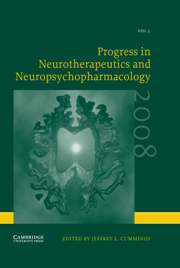Article contents
Targeting Amyloid with Tramiprosate in Patients with Mild-to-Moderate Alzheimer Disease
Published online by Cambridge University Press: 04 December 2007
Extract
ABSTRACT
Background: Tramiprosate (3-amino-1-propanesulfonic acid, 3APS, ALZHEMED™) is an investigational product candidate that is believed to reduce amyloid deposition in the brain by binding to soluble Aβ, thereby slowing or halting the progression of Alzheimer Disease (AD). Design and Methods: We assessed the safety, tolerability, and pharmacokinetic/pharmacodynamic profiles of tramiprosate in a randomized, double-blind, placebo-controlled Phase II study in which 58 subjects with mild-to-moderate AD were randomly assigned to receive placebo or tramiprosate 50, 100, or 150 mg BID for 3 months. At the end of the double-blind study, 42 of these patients entered an open-label extension study in which they received tramiprosate 150 mg BID for an additional 17 months. Assessments included plasma and CSF tramiprosate concentrations, CSF Aβ42 concentrations, and psychometric tests (Alzheimer's Disease Assessment Scale – cognitive subscale, Mini-Mental State Examination, and Clinical Dementia Rating Scale – Sum of Boxes). Results: Tramiprosate had no significant impact on vital signs or laboratory test values. The most frequent side effects were nausea, vomiting, and diarrhea, which were intermittent and mild-to-moderate in severity. Overall, six tramiprosate-treated patients discontinued because of side effects (all causalities) and there were no drug-related serious adverse events. Tramiprosate crossed the blood–brain barrier and dose-dependently reduced CSF Aβ42 levels after 3 months of treatment. There were no psychometric score differences between treatment groups after 3 months of double-blind treatment. However, psychometric score changes over the 17-month open-label extension study are consistent with a slowing of cognitive and clinical decline, particularly in mild subjects. Interpretation: Long-term administration of tramiprosate is safe and tolerated in patients with mild-to-moderate AD. The short-term reduction of CSF Aβ42 levels and the long-term open-label cognitive and clinical assessments are consistent with disease-modification.
- Type
- Research Article
- Information
- Progress in Neurotherapeutics and Neuropsychopharmacology , Volume 3 , Issue 1 , January 2008 , pp. 111 - 125
- Copyright
- © 2008 Cambridge University Press
Footnotes
References
- 1
- Cited by


